

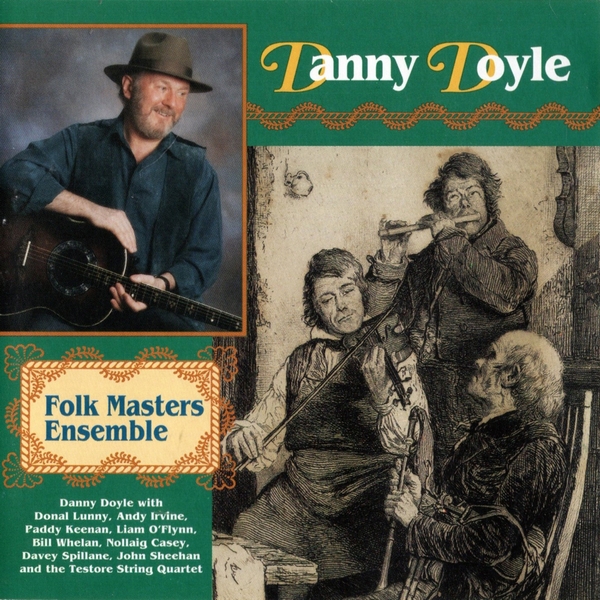 |
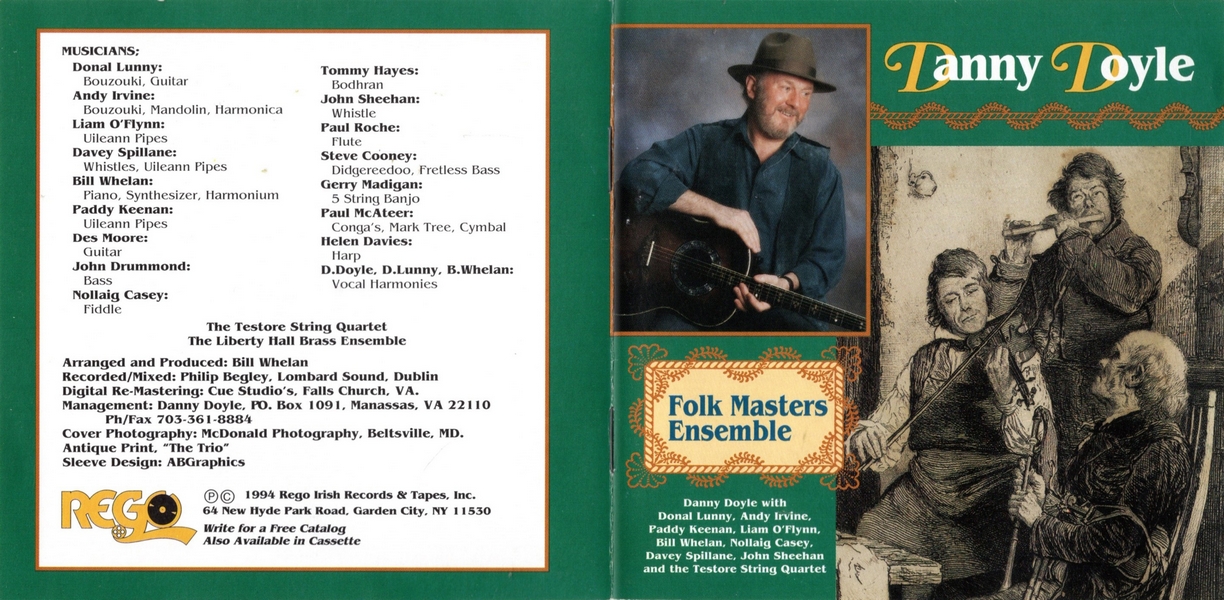
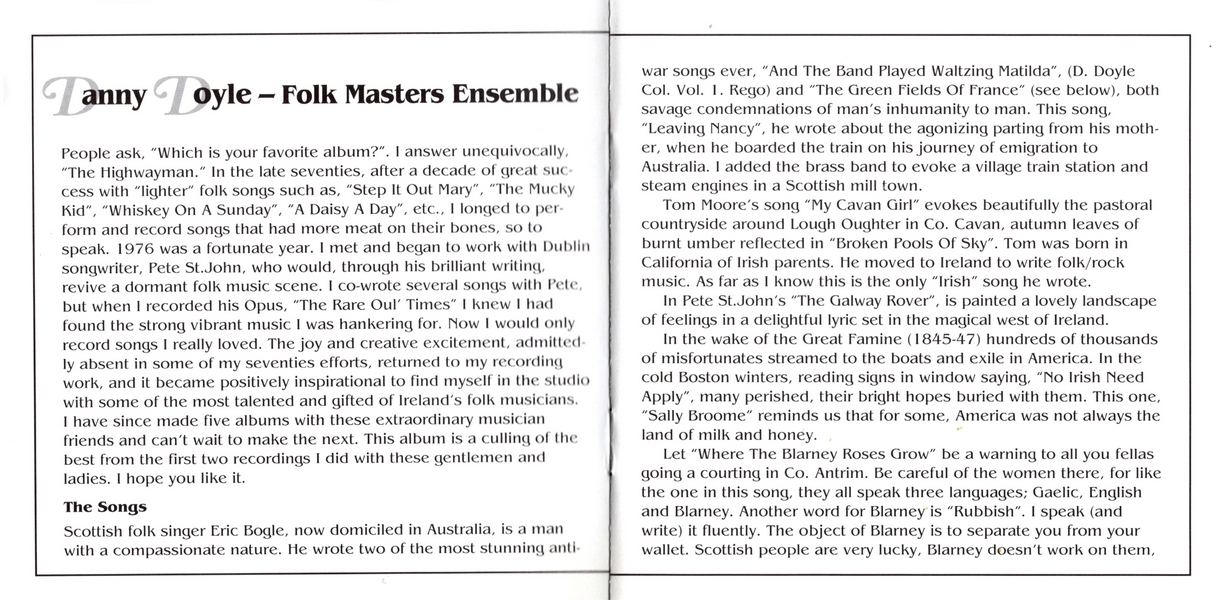 |
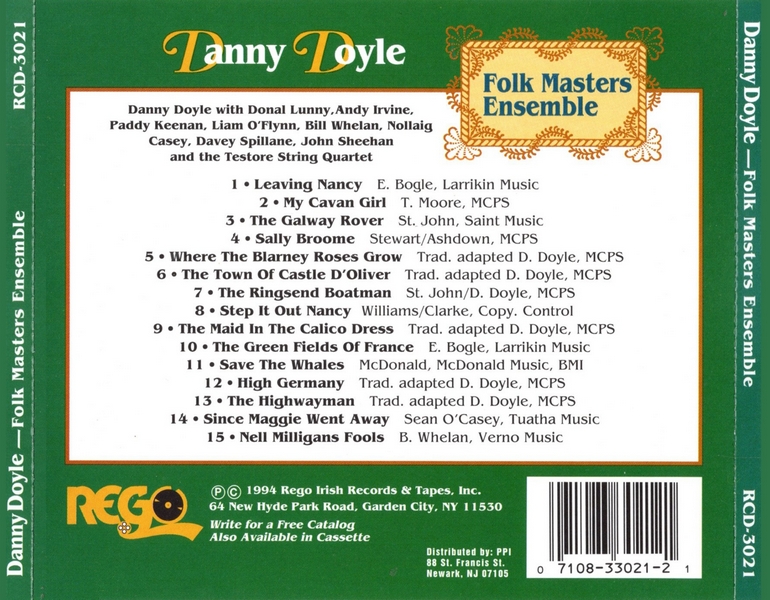
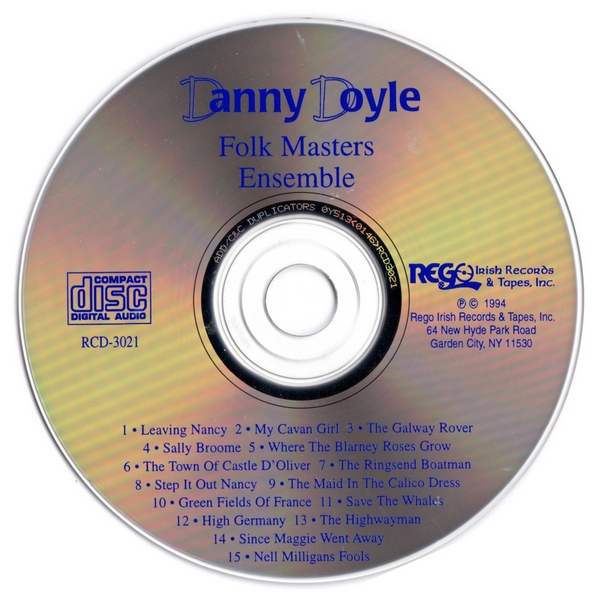 |
| more images |
Sleeve Notes
Danny Doyle — Folk Masters Ensemble
People ask, "Which is your favorite album?". I answer unequivocally, "The Highwayman." In the late seventies, after a decade of great success with "lighter" folk songs such as, "Step It Out Mary", "The Mucky Kid", "Whiskey On A Sunday", "A Daisy A Day", etc., I longed to perform and record songs that had more meat on their bones, so to speak. 1976 was a fortunate year. I met and began to work with Dublin songwriter, Pete St.John, who would, through his brilliant writing, revive a dormant folk music scene. I co- wrote several songs with Pete, but when I recorded his Opus, "The Rare Oul? Times" I knew I had found the strong vibrant music I was hankering for. How I would only record songs I really loved. The joy and creative excitement, admitted ly absent in some of my seventies efforts, returned to my recording work, and it became positively inspirational to find myself in the studio with some of the most talented and gifted of Ireland's folk musicians. I have since made five albums with these extraordinary musician friends and can't wait to make the next. This album is a culling of the best from the first two recordings I did with these gentlemen and ladies. I hope you like it.
The Songs
Scottish folk singer Eric Bogle, now domiciled in Australia, is a man with a compassionate nature. He wrote two of the most stunning anti war songs ever, "And The Band Played Waltzing Matilda", (D. Doyle Col. Vol. 1. Rego) and "The Green Fields Of France" (see below), both savage condemnations of man's inhumanity to man. This song, "Leaving Nancy", he wrote about the agonizing parting from his mother, when he boarded the train on his journey of emigration to Australia, I added the brass band to evoke a village train station and steam engines in a Scottish mill town.
Tom Moore's song "My Cavan Girl" evokes beautifully the pastoral countryside around Lough Oughter in Co. Cavan, autumn leaves of burnt umber reflected in "Broken Pools Of Sky". Tom was born in California of Irish parents. He moved to Ireland to write folk/rock music. As far as I know this is the only "Irish" song he wrote.
In Pete St.John's "The Galway Rover", is painted a lovely landscape of feelings in a delightful lyric set in the magical west of Ireland.
In the wake of the Great Famine (1845- 47) hundreds of thousands of misfortunates streamed to the boats and exile in America. In the cold Boston winters, reading signs in window saying, "Ho Irish Heed Apply", many perished, their bright hopes buried with them. This one, "Sally Broome" reminds us that for some, America was not always the land of milk and honey.
Let "Where The Blarney Roses Grow" be a warning to all you fellas going a courting in Co. Antrim. Be careful of the women there, for like the one in this song, they all speak three languages; Gaelic, English and Blarney. Another word for Blarney is "Rubbish". I speak (and write) it fluently. The object of Blarney is to separate you from your wallet. Scottish people are very lucky, Blarney doesn't work on them, they have to be surgically removed from their cash!
The car headlights danced on the waters of the canal. The moon was ascending over the hulk of Slieve Mish Mountain as we passed over Blennerville Bridge, Tralee Bay all silver and grey shimmering in the night. In the passenger seat sat my friend, the uncrowned King of Tralee, Ned Kelleher, the towns most famous jarvey and raconteur, larger than life, the beguiling legendary wit and repository of a thou sand songs. Music and Guinness had made us hungry, so Ned had promised us home made "noodle soup". That woke me. Ned a cook? Wonders of the world! Guinness bottles were produced, the stove lit under a huge pot. Three quarters of a crate of Guinness and an hour later the "soup" began to bubble. "'Tis Ready Lads," said Ned, stabbing vigorously with a long fork into the steaming pot. The fork lifted and a large object plopped onto a plate. "Get stuck in Danny boy, pull away at his nose, that's the best part." Through a haze of Guinness and vapor I perceived it was a boiled pigs head! Ah, now I get it — noodle soup! Breakfast over, Ned sang "The Town Of Castle D'Oliver." He learned it from the travelling people.
I co- wrote the "Ringsend Boatman" with Pete St.John. It is set in the first years of the 19th. Century, when Robert Emmett's ill fated Dublin rebellion of 1803 had come and gone, "Like the passing storms that sweep so rapidly over the ever changing Irish sky." (Lecky, History Of Ireland In The 18th. Century.) When Emmett was captured, his trial and sentence were a foregone conclusion. His speech from the dock would echo through the history of the next hundred years with romantic persistence, and profoundly moved even the callous judge who sentenced him to be hung, drawn and quartered. This is the story of one of his more fortunate followers who escapes to France, a traditional refuge of Irish revolutionaries.
In 1965 in the Crubeen Club in London, Sean McCarthy gave me a song he had written called "Step It Out, Mary." It was the first song I recorded. Years later in Philadelphia, Irish musician and "enthnomusicologist" Mick Moloney introduced me to "Step It Out, Nancy" by Robin and Linda Williams. It's the same song transplanted from Cork to Wyoming, though with a better story and more conclusive ending.
"The Maid In The Calico Dress" started life as a poem, by Henry Nutter. It's a lovely example of 19th. Century love poetry wherein the charms of nature pale against those of a beautiful and ideal girl. Nutter's descriptions of natural surroundings are most charming. I have set the song on the graceful slopes of the Comeragh Mountains in Co. Waterford, a landscape of hayfields, orchards and moorland, perfect for love's musings.
The indignation and pity expressed in Eric Bogle's anti- war song, "The Green Fields Of France," is not an evocation of triumph or desperate glory, but a savage condemnation of the madness that was World War One. It's powerful simplicity brings to mind Wilfred Owens war poems:
"I dreamed kind Jesus had fouled the big- gun gears;
and caused a permanent stoppage in all bolts;
and buckled with a smile mausers and colts;
and rusted every bayonet with his tears."
The poet, like our "Young Willie McBride" of the song, died in the trenches of Flanders.
Country Joe McDonald wrote "Save The Whales." The force of world opinion possibly saved the Great Whales for posterity, but world opinion must be on it's guard, for there are vandal nation's eager to resume the slaughter. "Fish, I love and respect you very much; but I will kill you dead before the day ends." Ernest Hemingway: The Old Main And The Sea.
"Oh you ladies who smell of wild rose
think ye for your perfume where a man goes
think ye of the wives and the children who yearn
when their man ne'er returns from hunting the sperm."
My Donal (whaling song).
"The moot point is, whether Leviathan can long endure so long a chase, and so remorseless a havoc; whether he must not at last be exterminated from the waters, and the last whale, like the last man, smoke his last pipe, and then himself evaporate in the final puff." Herman Melville: Moby Dick.
"High Germany" probably refers to the Seven Years War (1756- 63) or the campaign in the low countries (1793). Of the many versions of the song this in my opinion is the most poignant. A heart rending tale on the pity of parting. Learned in a London folk club in 1966.
"The Highwayman" is one of my all time favorite pieces. It was written by English poet Alfred Noyes in 1880. He became Professor of Modern English Literature at Princeton University in 1914. It's been said the poem sings "The eternal passions and verities of life." I learned it in the Ice House Folk Club in Pasadena in 1970. The drama and imagery are magnificent. Hot so much a song, more like a seven minute word movie!
Scan O'Casey was born in 1884, and grew to a hard but pitying wisdom in the Dublin slums. A laborer on the railway, he was self edu cated. He served as Secretary to the Irish Citizen Army under James Connolly prior to the Easter Rebellion of 1916. His plays, "Juno And The Paycock," "The Plough And The Stars," etc., marked him as a brilliant new Irish theatrical voice. O'Casey had a great capacity for contention and eventually fought and fell out with everyone. When in 1928 his play "The Silver Tassie" was rejected by The Abbey Theatre, a bitter quarrel broke out. O'Casey went into exile and settled in Devon, England, never to return. His three volume autobiography is a masterpiece of writing. He wrote many lovely songs. "Since Maggie Went Away," is a favorite.
My good friend Billy Whelan one night, maddened by an enormous goo (unquenchable thirst), slowly appeased by a lake of gat (drink), was Inspired to compose (some would say decompose!) this ditty, "Hell Milligan's Fool's," in praise of Irish rural mating habits, about which apparently he knows a great deal. Lest he forget it he immediately wrote it down on his arm, his stomach, a piece of toilet paper and his Artificial Insemination Club membership card. Enjoy.
Yours, in songs and stories,
Danny Doyle